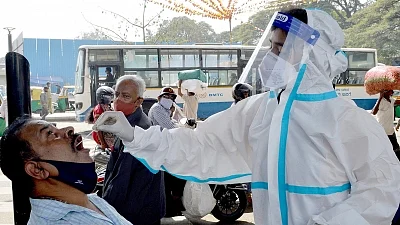Headache, fatigue, body ache, runny nose are main symptoms of Omicron variant, say experts
Several detected with Omicron variant were asymptomatic and in children there was abdominal pain and diarrhoea

With 8,209 Omicron cases detected so far in the country, which is a rise of 6.02% in the number of such cases in the last 24 hours, it’s becoming clearer that some of the symptoms of this variant are slightly different from the previous Covid-19 variants. A lot of headaches, body aches and upper respiratory tract infections are being reported more and fewer people are recording loss of taste and smell.
Data published in the UK showed that the top five symptoms reported for Omicron infection were runny nose, headache, fatigue (either mild or severe), sneezing, and sore throat. In another study by the Washington State Department of Health, 64% of the patients studied recorded headaches, sore throat and cough as the main symptoms of this variant.
“This variant appears to be more like other upper respiratory infections and cause more sore throat, headache, and congestion, versus lower respiratory infection symptoms. It is less common to have lost of taste and smell,” stressed Dr Amesh Adalja, infectious disease expert at the John Hopkins Centre for Health Security.
Explaining the symptoms, professor at the AIIMS Centre for Community Medicine, Dr Anand Krishnan said these symptoms are largely driven by the fact that omicron is not affecting lower respiratory infections. However, he underscored that it is should also be made clear that one cannot distinguish between these two strains based on symptoms alone.
“Omicron is more of an upper respiratory infection and hence has more sore throat and nasal congestion while Delta has more cough and breathlessness. Loss of taste and smell are less likely in omicron. Severe fatigue without other severe symptoms is also being seen more in Omicron,” added Krishnan.
He noted that there were fewer hospital admissions due to three parallel reasons - high coverage with vaccination, occurrence of natural infection during the second wave in a large section of the population and the lower severity of the infection with omicron variant.
According to Adalja, it has been established that this new variant has been able to avoid some of the immunity provided by prior infection in vaccines and is therefore very contagious. It also appears to be less severe than prior variants too. Adalja also observed that there appeared to be less need for supplemental oxygen with Omicron versus other variants.
In the national capital, Lok Nayak Jai Prakash Narayan Hospital in central Delhi was designated as the dedicated hospital to treat those who have been tested with Omicron. The MD of the hospital, Dr Suresh Kumar said they have seen more than 200 cases of Omicron so far of which a majority of them were asymptomatic.
“More than half of those detected with the Omicron variant in the hospital did not have symptoms. In 30% of the patients with symptoms, we have commonly seen weakness, body aches in several patients with Omicron. A few patients had pain in the throat, runny nose, mild cough and low grade fever. In children who had Omicron variant of Covid-19, we saw that they had pain in the abdomen and diarrhea,” pointed out Suresh.
Majority of those admitted at LNJP Hospital with the Omicron variant did not need oxygen support and cytokine storm was not observed in any of the patients, observed Suresh. A cytokine storm is, according to medical journals, a severe immune reaction in which the body releases too many cytokines into the blood too quickly. Cytokines storm occurs when the body, in an attempt to kill the virus, attacks its own cells and tissues.
During the second Covid-19 wave in 2021, several patients who had tested positive for Covid-19 suffered from severe symptoms after their bodies triggered a cytokine storm in an attempt to kill the virus. It ended up affecting several of their organs and their condition turned serious.
Warning against taking this variant lightly, Adalja pointed out that while the overall rate of an individual being hospitalised may be lowered, but because this is more contagious it may infect more people, some of whom have risk factors for hospitalisation, so the overall hospitalisation numbers could exceed prior variants.
Follow us on: Facebook, Twitter, Google News, Instagram
Join our official telegram channel (@nationalherald) and stay updated with the latest headlines